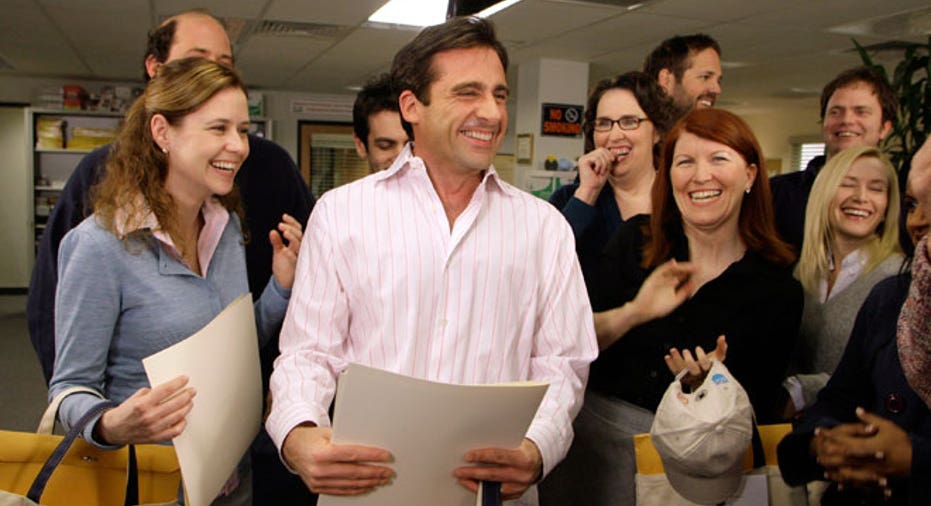Career Lessons From the ‘The Office’

After nine seasons, NBC’s “The Office” is retiring the “World’s Best Boss” mug for good.
The fan favorite show detailed the ups and downs and office shenanigans of paper company Dunder Mifflin in a mocumentary-style series. The show parodied common office situations that we’ve all experienced: office romances, kitchen etiquette battles and of course, the relationship between employers and the boss.
The cast bid adieu to its delusional, self-absorbed boss, Michael Scott, played by Steve Carrell in season seven, but that doesn’t mean employers and employees the like can’t learn a couple lessons from him.
Michael Scott’s biggest downfall may have been that he was more concerned about being his workers’ friend than boss, says Hillary Busis, writer for EW.com.
“He cares so much more about being liked than he does about being a boss,” she says. “He calls his employees his ‘friends and family’ and that is his biggest fault.”
Memorable examples of Scott’s misguided leadership can be found in just about every episode, like the office Christmas party in Season two that included a gift exchange with a $10 spending limit. Carell’s character bought an iPod for his recipient. “He blatantly disregards the rule he set himself in order to try to impress someone that works for him,” Busis says. “He wants [the other character] to be his best friend.”
While the series provided lots of laughs, in reality, these missteps could be detrimental to an office’s morale and productivity, here are some other dos and don’ts from the cast of “The Office”:
Don’t: Try too hard to please. Another notorious Michael Scott slip up is when he attempts to show his acceptance of a homosexual employee by kissing him.
The awkward interaction is “one of the most painful scenes in the entire series,” Busis says.
You can be accepting of your employees without going overboard--- or kissing them.
Do: Demonstrate your skills. Michael’s countless favorite movies, characters and skits were sprinkled throughout the series, but one memorable scene is when he is giving a presentation to his corporate bosses and kicks things off with a cheesy montage of the “Faces of Scranton” before getting down to business.
“They did demonstrate throughout the series that he was actually good at his job,” Busis says. “He knows his clients and is a good salesperson. He shows this ridiculous video, but then breaks out his real report. He knew he had to prepare, but did this very ‘Michael-Scott-y’ thing to prove his creativity. He knows how to do the job, just prefers not to.”
Do and Don’t: Dating in the office. Over its run, the show had many memorable relationships in the office—Jim and Pam, Dwight and Angela, Michael and Holly—just to name a few. While every company has its own policy regarding dating in the workplace, Busis says oftentimes full disclosure is the way to go. Jim and Pam Halpert (nee Beesly) came clean with their romance, and went on to have a happy marriage and family. Even if the entire office came to their wedding.
“The main way to get [inter-office dating] right is to not have it be completely secret,” Busis says. “Don’t do things that will get you in trouble, like when Dwight and Angela sneak off into the [paper] warehouse to have sex. Acknowledge the relationships exists, like Jim and Pam, who don’t have a lot of PDA in the office or draw attention to themselves.”
Do: Take training seriously. Another memorable Dunder blunder is in the “Diversity Day” episode, where Michael makes each staffer guess their nationality by asking them stereotypical questions.
“Sexual harassment and diversity training are not excuses to say every sexist and racist thing you can think of,” Busis says. “Michael’s heart is in the right place, but he doesn’t understand that.”
Don’t: Mistreat people…blatantly. Much of the tension in the workplace came from Michael’s outright hatred of the character Toby Flederson, the downtrodden human resources manager. Michael also hires his nephew as an intern in later seasons, and then spanks him over his knee in front of the entire staff. Both are major don’ts in the workplace today, Busis says.
“Toby doesn’t deserve the abuse he gets,” she says. “The only reason Michael is so mean to him is because he has to step in and gently tell him when he is and isn’t behaving appropriately. And interns should be treated like people—an intern is not a slave, or someone to be used as an example for the rest of the office.”



















